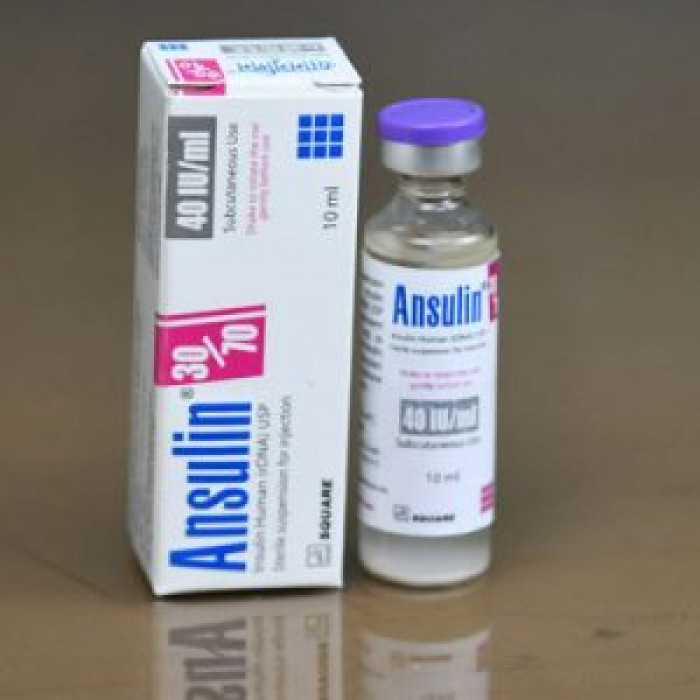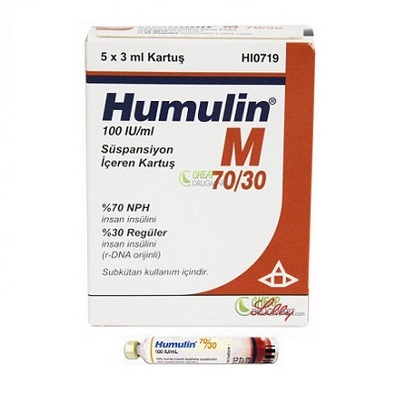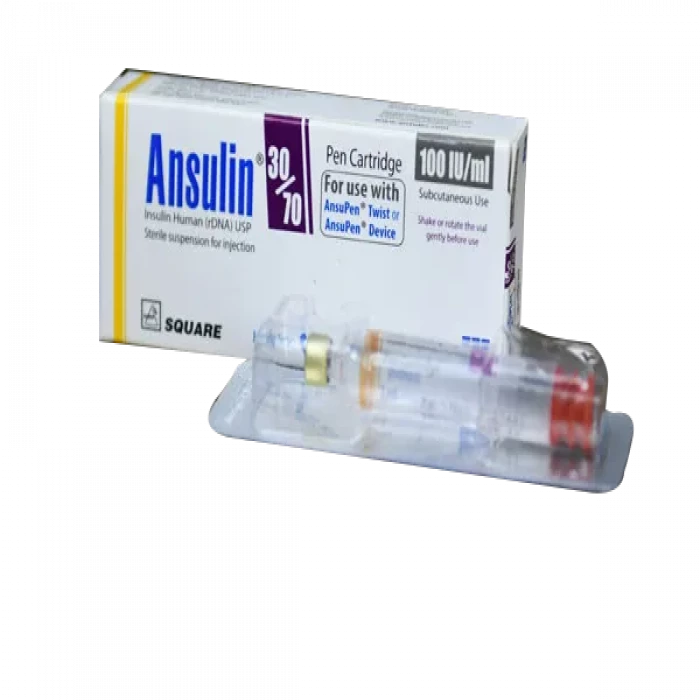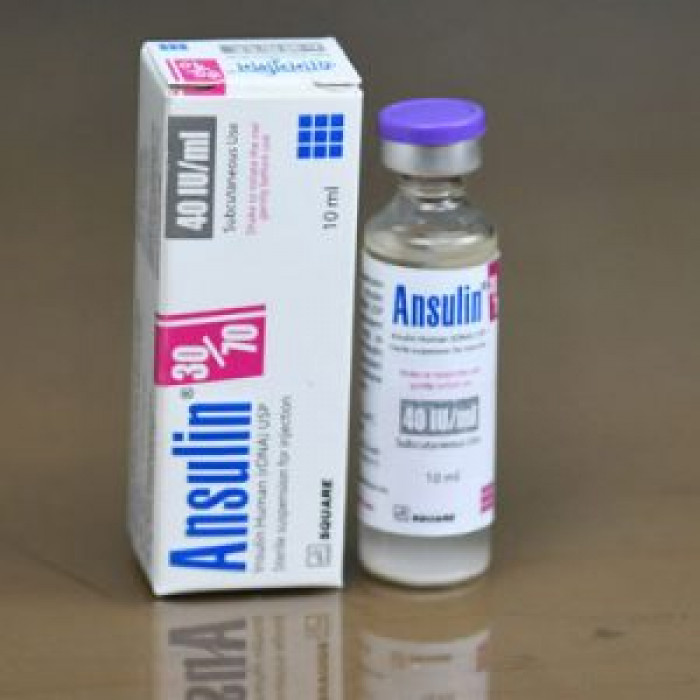
✔ 100% Authentic Product
👁️ Currently Viewing 1965
Ansulin 50/50 Vial 100IU/ml
Ansulin 50/50 Vial 100IU/ml is a combination of two medicines, an intermediate-acting and a short-acting type of insulin. It is used in the treatment of diabetes mellitus (type 1 and 2) to improve blood sugar control both in adults and children. It helps maintain the blood sugar levels in diabetic patients.
Discount
Price: ৳ 394
MRP:
৳
415
5%
Off

100% Genuine Products, Guaranteed

Safe & Secure Payments, Always

Fast, Secure & Efficient Delivery

Proper Packaging
 Cash on Delivery - All over Bangladesh
Cash on Delivery - All over Bangladesh Regular Delivery - 12-24 Hours, Dhaka City* Charge Tk.39-59
Regular Delivery - 12-24 Hours, Dhaka City* Charge Tk.39-59 Regular Delivery - 24-48 Hours, Other Cities* Charge Tk.99-110
Regular Delivery - 24-48 Hours, Other Cities* Charge Tk.99-110
 ফ্রি ডেলিভারিঃ - ৯৯৯ টাকা+ অর্ডারে, ঢাকা
শহরে
ফ্রি ডেলিভারিঃ - ৯৯৯ টাকা+ অর্ডারে, ঢাকা
শহরে ফ্রি ডেলিভারিঃ - ২৯৯৯ টাকা+ অর্ডারে, ঢাকার
বাহিরে
ফ্রি ডেলিভারিঃ - ২৯৯৯ টাকা+ অর্ডারে, ঢাকার
বাহিরে
100% Genuine Products, Guaranteed
Safe & Secure Payments, Always
Fast, Secure & Efficient Delivery
Proper Packaging
 Cash on Delivery - All over Bangladesh
Cash on Delivery - All over Bangladesh Regular Delivery - 12-24 Hours, Dhaka City* Charge Tk.39-59
Regular Delivery - 12-24 Hours, Dhaka City* Charge Tk.39-59 Regular Delivery - 24-48 Hours, Other Cities* Charge Tk.99-110
Regular Delivery - 24-48 Hours, Other Cities* Charge Tk.99-110 ফ্রি ডেলিভারিঃ - ৯৯৯ টাকা+ অর্ডারে, ঢাকা
শহরে
ফ্রি ডেলিভারিঃ - ৯৯৯ টাকা+ অর্ডারে, ঢাকা
শহরে ফ্রি ডেলিভারিঃ - ২৯৯৯ টাকা+ অর্ডারে, ঢাকার
বাহিরে
ফ্রি ডেলিভারিঃ - ২৯৯৯ টাকা+ অর্ডারে, ঢাকার
বাহিরে
✅ Description:
HUMAN INSULIN+INSULIN ISOPHANE is used to treat both type 1 and type 2 diabetes mellitus. In type 1 diabetes, the body lacks sufficient insulin to control blood sugar, while in type 2 diabetes, insulin production is inadequate or there's resistance to its action.
This medication is a combination of two insulin types: human insulin (short-acting) and insulin isophane (intermediate-acting). It works by reducing liver sugar production and aiding sugar uptake into fat and muscle cells for consistent blood sugar control.
- Take as directed by your doctor.
- If not confident in self-administering, ask a healthcare professional.
- Possible side effects include injection site reactions, low blood sugar, itching, skin changes, swelling, rashes, and weight gain. Most resolve over time, but persistent effects should be discussed with a doctor.
- Consult a doctor if pregnant or breastfeeding.
- Be cautious while driving due to potential drowsiness.
- Avoid alcohol as it can cause adverse effects.
- Children should use this only under a doctor's prescription.
- Inform your doctor about health conditions and medications to prevent interactions.
- Store between 2-8°C; avoid freezing.
Safety Advices

Alcohol
UNSAFE
it's considered unsafe to consume alcohol while using Ansulin 50/50 Vial 100IU/ml.

Pregnancy
CONSULT YOUR DOCTOR
Using Ansulin 50/50 Vial 100IU/ml during pregnancy is generally considered safe, as animal studies show limited adverse effects on the developing baby. However, there are limited human studies, so caution is advised.

Breastfeeding
CONSULT YOUR DOCTOR
Ansulin 50/50 Vial 100IU/ml is considered safe to use during breastfeeding. Human studies suggest that the drug doesn't pass into breast milk significantly and isn't harmful to the baby.

Driving
UNSAFE
Be cautious about driving if your blood sugar levels are too low or too high, as it can affect your ability to drive safely.

Kidney
CONSULT YOUR DOCTOR
Use Ansulin 50/50 Vial 100IU/ml with caution in patients with kidney disease. Dose adjustment may be necessary. Regular blood glucose monitoring is recommended for dose adjustments.

Liver
CONSULT YOUR DOCTOR
Use Ansulin 50/50 Vial 100IU/ml with caution in patients with liver disease. Dose adjustment may be needed. Regular glucose level monitoring is advised for dose adjustments.
✔️ Uses of Ansulin 50/50 Vial 100IU/ml
- Type I Diabetes mellitus
- Type II Diabetes Mellitus
✔️ How does Ansulin 50/50 Vial 100IU/ml work?
Ansulin 50/50 Vial 100IU/ml is a replacement for insulin which works by enhancing glucose uptake for energy production. This helps in controlling blood sugar levels.
✔️ Side Effects of Ansulin 50/50 Vial 100IU/ml
- Allergic reaction at the site of injection
- Hypoglycemia (low blood glucose level)
- Itching
- Lipodystrophy (skin thickening or pits at the injection site)
- Oedema (swelling)
- Rashes
- Weight gain
✔️ Quick Suggestions:
- Take it 15 minutes before a meal or within 20 minutes after starting a meal.
- Injection below the skin of the abdomen results in faster absorption than other injection sites such as the skin of the upper arms, thighs, or buttocks. After injection, the site of injection should not be massaged.
- Injection sites must be rotated to prevent hard lumps from developing at one site.
- Change to another type or brand of insulin should be done under strict medical supervision as it may require a change in dosage.
- Hypoglycemia (low blood sugar level) may occur when taken along with other antidiabetic medicines, alcohol, or by delaying/skipping a meal. Carry a sugar source with you for immediate relief.
- Do not share your insulin device with other people, even if the needle has been changed. You may give other people a serious infection or get a serious infection from them.
- Opened vials/cartridges stay good at room temperature for up to 4 weeks, while unopened vials must be placed in the refrigerator (2°C–8°C).
✔️ Indication of Ansulin 50/50 Vial 100IU/ml
Ansulin 50/50 Vial 100IU/ml combines insulin isophane (long-acting) and human insulin (short-acting) to offer both quick and prolonged effects, aiding in blood sugar control. This injection is used alongside other blood sugar-lowering medications for both type 1 and type 2 diabetes. It's designed to help maintain optimal blood sugar levels in individuals with diabetes.
✔️ Pharmacology
Human insulin (rDNA) is a type of insulin produced through recombinant DNA technology. It mirrors natural insulin in both structure and function. Insulin plays a crucial role in regulating glucose metabolism by promoting glucose uptake and utilization in the liver, muscles, and adipose tissue. Additionally, it reduces blood sugar levels by enhancing sugar consumption and suppressing gluconeogenesis (sugar production).
Specifically, Insulin Human (rDNA) 30/70 and Insulin Human (rDNA) 50/50 formulations have these characteristics:
- Onset: They start working around 30 minutes after injection.
- Peak: Their effects peak after about 28 hours.
- Duration: They remain active for approximately 24 hours.
These insulin formulations are designed to provide consistent blood sugar control and help manage diabetes effectively.
✔️ Dosage & Administration of Ansulin 50/50 Vial 100IU/ml
The typical daily insulin requirement for maintenance therapy in individuals with type 1 diabetes usually falls between 0.5 and 1.0 IU/kg. In pre-pubertal children, this range is typically 0.7 to 1.0 IU/kg. However, cases with insulin resistance, such as during puberty or due to obesity, might require significantly higher daily insulin doses. Initial doses for type 2 diabetes patients are often lower, around 0.3 to 0.6 IU/kg/day.
Insulin dosage and administration can vary significantly based on individual patient differences. Factors like the form of insulin, timing of administration, diet, work routine, and exercise intensity all influence the dosage. Thus, it's crucial for patients to use insulin as directed by their doctor, as individualized instructions are necessary to ensure safe and effective management of their condition.
✔️ Instructions:
Follow your doctor's instructions when using Ansulin 50/50 Vial 100IU/ml. Ensure the needle remains under the skin for at least six seconds to inject the full dose. Rotate injection sites monthly to prevent lipodystrophy, which affects insulin absorption due to fat breakdown.
Never share injection pens, cartridges, or syringes, even if the needles are changed. Consume a high-carbohydrate meal within 30 minutes of the injection. Keep this medicine out of reach of children and pets.
Stick to the prescribed dosage; do not use more or less without consulting your doctor. If you encounter any unwanted side effects, seek medical advice.
✔️ Interaction
Interactions with Other Medicines:
- Low Blood Sugar Symptoms: If you take other diabetes medications, fluoxetine (for depression), salicylates (for fever and pain), ramipril, or lisinopril, you might experience symptoms of low blood sugar.
- High Blood Sugar Symptoms: If you're on oral contraceptives, thiazides, steroids, thyroxine, or medications for diarrhea and abnormal growth (like octreotide, and lanreotide), you may encounter high blood sugar levels.
- Cautions with Pioglitazone: If using pioglitazone to treat diabetes, be cautious due to reported cases of heart attacks and heart failures.
Medications Blocking Low Blood Sugar Symptoms:
- Certain medications can mask low blood sugar symptoms, leading to a drop in blood sugar without the usual warning signs. Inform your doctor if you're taking Beta-blockers (e.g., Metoprolol, Propranolol, Atenolol), Clonidine, Guanethidine, or Reserpine.
Interactions with Food:
- Take the medicine 15 minutes before meals or within 20 minutes after starting a meal.
- Maintain a consistent meal schedule while using insulin.
- Avoid skipping or delaying meals when taking insulin.
✔️ Contraindications
Hypoglycemia, characterized by low blood sugar, is the primary adverse reaction during insulin therapy. Symptoms can manifest abruptly. Some instances of allergic reactions, like redness and itching, have been reported. Typically, these reactions fade after a short duration. Allergies could result from factors beyond insulin, like disinfectants or improper injection techniques. It's crucial to be vigilant and consult a healthcare professional for guidance and management of such reactions.
✔️ Pregnancy & Lactation
There are no restrictions on the use of insulin to treat diabetes during pregnancy because insulin cannot cross the placental barrier. Insulin therapy for breastfeeding mothers does not pose any risk to the baby.
✔️ Precautions & Warnings
Discuss these points with your doctor if:
- You frequently experience low blood sugar levels.
- Be cautious of low blood sugar symptoms like sweating, anxiety, rapid heartbeats, headache, strong hunger, restlessness, dizziness, and irritability. In such cases, consume sugar (avoid artificial sweeteners) or eat promptly. Avoid using insulin. If symptoms persist, seek medical attention.
- You have a fever or infection.
- You have liver or kidney diseases.
- You have thyroid issues.
- You're using different insulin brands.
- If you encounter pain, itching, or swelling at the injection site; change the injection site.
- Avoid intense exercise.
- You're altering your diet.
- Carry sugar candy.
- If you're using insulin but not consuming sufficient meals, your blood glucose may significantly drop.
✔️ Storage Conditions
Store the insulin at a temperature of 2°C - 8°C in a refrigerator, and avoid freezing it. If you need to use insulin in the near future, it doesn't necessarily have to be refrigerated; instead, keep it in a cool area away from heat and light. Once in use, insulin can be kept at room temperature for up to a month.
⚠️Disclaimer:
At ePharma, we’re committed to providing accurate and accessible health information. However, all content is intended for informational purposes only and should not replace medical advice from a qualified physician. Please consult your healthcare provider for personalized guidance. We aim to support, not substitute, the doctor-patient relationship.











